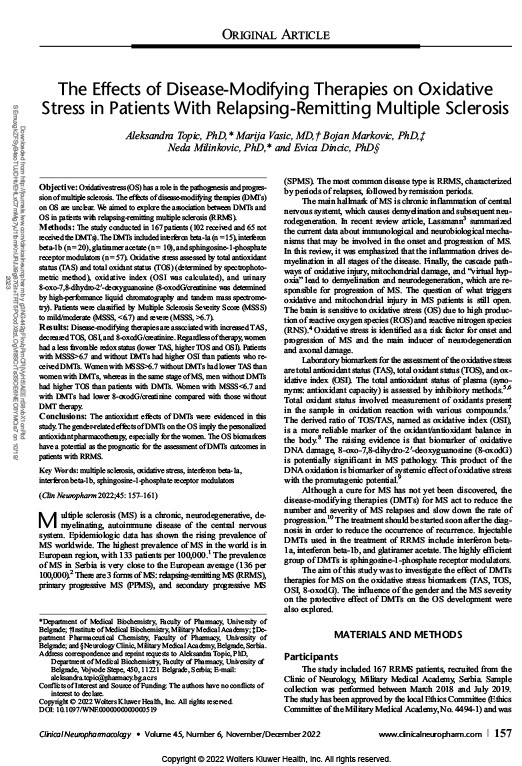The Effects of Disease-Modifying Therapies on Oxidative Stress in Patients With Relapsing-Remitting Multiple Sclerosis
Dec 22
Objective
Oxidative stress (OS) has a role in the pathogenesis and progression of multiple sclerosis. The effects of disease-modifying therapies (DMTs) on OS are unclear. We aimed to explore the association between DMTs and OS in patients with relapsing-remitting multiple sclerosis (RRMS).
Methods
The study conducted in 167 patients (102 received and 65 not received the DMTs). The DMTs included interferon beta-1a (n = 15), interferon beta-1b (n = 20), glatiramer acetate (n = 10), and sphingosine-1-phosphate receptor modulators (n = 57). Oxidative stress assessed by total antioxidant status (TAS) and total oxidant status (TOS) (determined by spectrophotometric method), oxidative index (OSI was calculated), and urinary 8-oxo-7,8-dihydro-2′-deoxyguanosine (8-oxodG/creatinine was determined by high-performance liquid chromatography and tandem mass spectrometry). Patients were classified by Multiple Sclerosis Severity Score (MSSS) to mild/moderate (MSSS, <6.7) and severe (MSSS, >6.7).
Results
Disease-modifying therapies are associated with increased TAS, decreased TOS, OSI, and 8-oxodG/creatinine. Regardless of therapy, women had a less favorable redox status (lower TAS, higher TOS and OSI). Patients with MSSS>6.7 and without DMTs had higher OSI than patients who received DMTs. Women with MSSS>6.7 without DMTs had lower TAS than women with DMTs, whereas in the same stage of MS, men without DMTs had higher TOS than patients with DMTs. Women with MSSS<6.7 and with DMTs had lower 8-oxodG/creatinine compared with those without DMT therapy.
Conclusions
The antioxidant effects of DMTs were evidenced in this study. The gender-related effects of DMTs on the OS imply the personalized antioxidant pharmacotherapy, especially for the women. The OS biomarkers have a potential as the prognostic for the assessment of DMTs outcomes in patients with RRMS.

